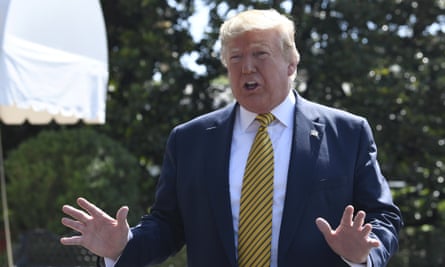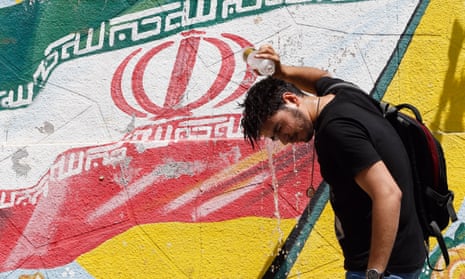Donald Trump has said that if Iran does not acquire a nuclear weapon, it will be prosperous and have the US president as “a best friend” – but also warned that the Islamic Republic would be “obliterated” in any war between the two countries.
Trump’s remarks on Saturday morning came in the wake of his eleventh-hour decision to call off airstrikes in reprisal for the downing of a US surveillance drone. They are significant in that they differ starkly from the official line of his own administration: that Iran must fulfil a list of 12 US demands before sanctions can be lifted.
“They’re not going to have a nuclear weapon,” Trump told reporters before leaving the White House for Camp David. “We’re not going to have Iran have a nuclear weapon.
“When they agree to that, they’re going to have a wealthy country. They’re going to be so happy, and I’m going to be their best friend. I hope that happens.”
Iran has insisted it has no intention of acquiring nuclear weapons and the International Atomic Energy Agency has said there is no recent evidence of development or experimentation with weaponisation. Iran has so far stuck to the limits on its nuclear programme agreed in a multilateral 2015 agreement.
But more than a year after Trump pulled the US out of the deal and imposed severe sanctions, the government in Tehran is threatening to break some of those agreed limits.
Iran has defended the shooting down of a US navy Global Hawk drone on Thursday morning, saying it had entered Iranian airspace.
A senior commander of the elite Revolutionary Guards struck a defiant note on Saturday, in comments quoted by the Islamic Republic News Agency (IRNA).
Brig Gen Amirali Hajizadeh, head of the Guards’ aerospace division, said: “This is our response to a violation of Iranian space and if the violation is repeated then our response will be repeated. It’s possible that this infringement of the Americans was carried out by a general or some operators.”
Hajizadeh appeared to be mirroring Trump’s suggestion that the shooting down of the drone was the work of a rogue Iranian general.
Trump said he would be holding meetings to discuss the standoff with Iran. In his remarks, he seemed to confirm for the first time an Iranian claim that there was a manned US spy plane in the air near the Global Hawk when the drone was brought down.
“There was a plane with 38 people yesterday, did you see that?” Trump said. “I think that’s a big story. They had it in their sights and they didn’t shoot it down. I think they were very wise not to do that. And we appreciate that they didn’t do that. I think that was a very wise decision.”

In an interview for NBC’s Meet the Press taped on Friday but due to air on Sunday, Trump said if a conflict did break out there would be “obliteration like you’ve never seen before”.
“But I’m not looking to do that,” he said, making clear that potential that Iran might build nuclear weapons was his sole concern.
Last May, secretary of state Mike Pompeo laid down 12 conditions for the normalisation of US-Iran relations, which included nuclear demands but also limits on missile development, withdrawal from Syria and an end to support for Houthi rebels in Yemen. Trump, who has been seeking to start a dialogue with Tehran, made no mention of non-nuclear conditions.
The combination of dire threats and openness to freewheeling dialogue echoes Trump’s approach to North Korea in 2017.
“Trump is notoriously mercurial but one thing he is consistent on is that he does not want to drag the US into a new war,” said Thomas Juneau, a former Canadian diplomat and assistant professor at the University of Ottawa.
“His face-saving solution is to say he called off a military strike on Iran. We have avoided direct violence, but the underlying issues are still there with no off-ramp or process at this point that could lead to a de-escalation.”
Trump said he was “getting praise” for having called off the reprisal strike.
“Everyone was saying I’m a warmonger,” he said. “Now they’re saying I’m a dove.”
He said his decision made clear he was not in thrall to the hawks he has appointed around him, including his national security adviser.
“I have John Bolton, who I would definitely say is a hawk,” he said. “I have other people that are on the other side of the equation. Ultimately I make the decision. The only one that matters is me. I listen to everybody. I want people on both sides.”
Trump also gave more detail on how the issue of estimated casualties from US strikes, predicted by 150 by the Pentagon, affected his decision.
“They gave me a rough estimate earlier, but I wanted a more accurate estimate, the more accurate estimates were, I won’t go into the number of sites, but ... it was on average 40 to 50 people to the site,” Trump said.
“I come from New York City, we have a lot of Iranians. And they’re great people. I have friends that are Iranians. They’re very smart, they’re very ambitious and tremendous high-quality people. I don’t want to kill 150 Iranians. I don’t want to kill 150 of anything or anybody, unless it’s absolutely necessary.”
On Saturday, the Iranian foreign ministry summoned a United Arab Emirates envoy to complain about the UAE allowing the US drone to be launched from a US base on its territory, the Iranian Fars news agency reported.
Foreign ministry spokesperson Abbas Mousavi told the semi-official Tasnim news agency: “Regardless of any decision [US officials] make, we will not allow any of Iran’s borders to be violated. Iran will firmly confront any aggression or threat by America.”
A diplomat in the region said: “Iran doesn’t just feel attacked by the military threat. It’s mostly by the sanctions. Even if the US doesn’t attack, Iran will perceive the sanctions as an escalation and may feel they have to respond to those. I don’t think the US understands this.
“Trump presents himself as open to negotiations, but he isn’t really. He won’t remove sanctions and rejoin the [nuclear deal] and anything he says isn’t credible because he pulled out of that agreement in the first place.”
In London on Saturday, the British government said a Foreign Office minister would visit Iran on Sunday to call for “urgent de-escalation in the region”.
The ministry said: “At this time of increased regional tensions and at a crucial period for the future of the nuclear deal, this visit is an opportunity for further open, frank and constructive engagement with the government of Iran.”
To NBC, Trump denied a report that US planes were in the air when he aborted the attack on Thursday night Washington time.
He said: “No, but they would have been pretty soon, and things would have happened to a point where you would not turn back, you could not turn back. Nothing was green lighted until the very end because things change.”
There has been some scepticism about Trump’s account. The Washington Post quoted US officials as saying the president had been given casualty estimates earlier in the day and had still approved the operation, which would likely have used Tomahawk sea-launched cruise missiles aimed at anti-aircraft batteries and other military targets. Trump has tweeted there were three targets in all.
According to the New York Times, the casualty estimate was supplied by Pentagon lawyers and passed to the president by White House counsel Pat Cipollone, bypassing hawkish national security aides. Tucker Carlson, the rightwing talk show host, reportedly told Trump a conflict with Iran would torpedo his chances of re-election.
The Times also quoted Gen Jack Keane, a retired army vice-chairman close to the Trump White House, as saying the president received information that Iranian leaders were furious with the local commander who had ordered the Global Hawk to be shot down.
